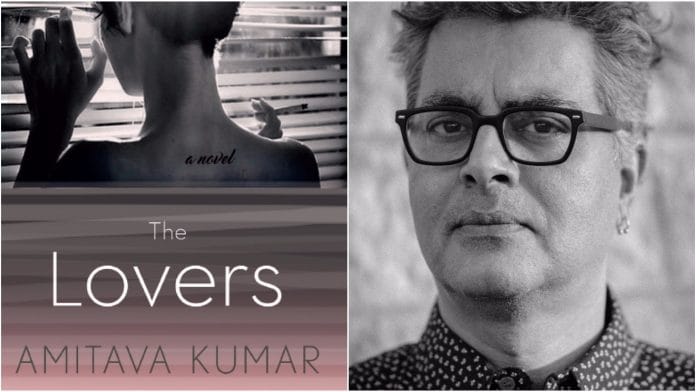‘The Lovers’ is a story of a young man as he navigates between love, lust, and self-exile in the United States.
Amitava Kumar’s ‘The Lovers’ is a novel with many facets. In its very essence, at the risk of being a reductive summary, the novel tells the story of a man’s self-discovery as he explores relationships and life away from home. The multilayered narrative follows Kailash, nicknamed AK-47 by his American peers, a man who is struggling in a society that is, for the most part, poles apart from the one he stems from.
The author, Amitava Kumar, has successfully managed to weave a story that has the texture of non-fiction; intermixing strands of politics with the personal journey of the protagonist. This results in a novel that is laced with melancholic romanticism that paves way for self-awareness and, eventually, redemption.
There is a recurring sense of nostalgia for the homeland in Kumar’s writing, and the novel is structured in a way that carries this pain, along with the protagonist’s self-awareness, constantly. The epigraph from Zadie Smith’s White Teeth captures the tone and mood of the book, making it evidently clear that the author is conscious in the creation of the protagonist’s fallacies. With the use of paper clippings, pictures and references to cinema and history, Kumar places the fictional journey in the realm of the real and the experienced, setting each chapter as a self-contained story.
The strength of his storytelling rests in all that is left unsaid in the novel. The author is aware on how to play with silences. At one point, the protagonist calls home and his sister informs him that their parents have gone to the village because their grandmother is ill. Kailash immediately understands that his grandmother has passed away. Similarly, the silence is used as a tool by most characters, including Kailash himself, to evoke various emotions throughout the novel; introspection being the most dominant aspect in such exchanges.
The weakest links in the book are the female characters, who are subjected to the male gaze, and aren’t defined beyond their relationships with the men who surround them. His first relationship is with a co-worker, Jennifer, and Kailash’s own sexual and emotional insecurity overshadows the actual relationship. Similarly, his relationship with Nina lacks proper communication. However, one exception is Cai Yan, a Chinese immigrant student, who refuses to limit herself as a mere lover, eventually leaving for India to research Naxalite movement. There are other lovers too, but none of them stick in the minds of the reader. At one point, it is understood that no matter how good the relationship is, it is doomed to fail.
In stark contrast is Kailash’s relationship with his professor, Ehsaan Ali. Modelled on the late anti-war political activist Eqbal Ahmad, Ehsaan grounds Kailash’s personal experiences with the political atmosphere of the novel. Exile- both forced and self-imposed- is a major theme in the novel. Whether it is discussing politics during the Reagan era or quoting Javed Qureshi’s ghazal, Ehsaan’s relationship with the protagonist is not only well etched, but also some of the most key moments in the novel. As a result, while women characters seem like a doorway to get rid of inner demons and insecurities, Ehsaan’s interaction with Kailash is the most emotionally satisfying element of the novel.
While this novel is a great addition to the contemporary literary scene in India, it is not a straightforward narrative. The emotional and psychological discovery of the self takes precedence over the linear timeline- the culmination of which leaves the reader content.
The author is a post graduate in Journalism and English literature from Indian Institute of Mass Communication and the University of Delhi, respectively.






